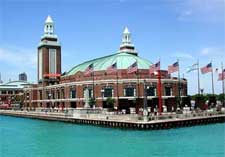
The Metropolitan Pier and Exposition Authority (MPEA) announced it will lease Navy Pier to a newly formed not-for-profit corporation that will separately govern and manage it, in addition, 13 Chicago civic leaders have agreed to serve on the corporation’s first board of directors.
Creation of the not-for-profit corporation was prescribed by MPEA Trustee Jim Reilly in his report on future Navy Pier governance filed last week with the Governor and the Illinois General Assembly as required by MPEA reform legislation enacted last spring.
In reporting his decision, Reilly cited the Urban Land Institute’s recent report on the Pier’s future, which stressed the historic and popular tourist attraction “needs a champion, a voice, speaking and advocating only for Navy Pier.”
Sarah Nava Garvey will serve as transitional chair of the new board. Garvey, a retired senior executive for the Boeing Company, is a member of the MPEA interim board, chair of the Shedd Aquarium, and a member of the Civic Federation Board.
Patrick F. Daly will serve as transitional co-chair. He is founder and CEO of The Daly Group, a Chicago-based group of real estate development, brokerage and construction management companies. He served on the MPEA board for 17 years, a period that included the initial renovation of Navy Pier.
In his report, Reilly wrote that the ULI made a compelling case for separating the governance of Navy Pier from that of McCormick Place.
“The businesses and purposes of the two entities are very different,” said Reilly. “In tight budgetary times, Navy Pier, as the junior partner, will often not receive its due. Further, the Pier is past due for a major revitalization which will require persistence and stability over a four or five year period, and a separate, dedicated civic board is better suited to see that vital project through.”
According to Reilly, of potential separate governance options, a not-for-profit corporation best reflects the strong public aspect of the Pier’s mission. That mission includes preserving the Pier’s heritage, maintaining and improving public spaces and ensuring free access and activities for the public such as fireworks and Winter WonderFest.
“Adopting such a governance proposal … will maintain public ownership of the Pier while providing a practical means to allow a group of public spirited citizens to revitalize the Pier while keeping it true to its purpose as the People’s Pier,” wrote Reilly.
MPEA will retain ownership of Navy Pier, but enter into a long-term lease with the 501 (c)(3) corporation giving it the authority to make key decisions on operations, maintenance and implementation of the Pier’s revitalization. The arrangement is similar to other situations in which not-for-profit corporations manage institutions on public land, such as the Lincoln Park Zoo, Museum of Science and Industry and others.
MPEA will provide an initial infusion of capital for deferred maintenance and seed money for Pier redevelopment. Major physical changes to the Pier would still have to be approved by MPEA, but a strategic plan currently being developed will be attached to the lease, enabling the new Navy Pier corporation to move ahead with pre-approved changes.
The lease will require that corporation meetings be open to the public with dates and times posted on its website, and that conflict of interest and ethics provisions be included in its by-laws along with MBE/WBE goals and policies consistent with those in the MPEA Act. For the sake of continuity, the lease will also require that the new corporation retain senior Pier management for at least two years.
While the primary function of the board will be civic-minded management of the Pier, Reilly said it might also raise funds for non-commercial areas of the Pier such as a park at the east end.
In recent years, Navy Pier has operated at or above the break-even point as a mix of commercial and public uses.
Membership on the initial not-for-profit board was determined by outreach to civic leaders by Reilly and the Interim MPEA Board, first to assess feasibility of the not-for-profit governance concept, and then to determine interest in serving on such a board.
They sought both well-established civic leaders, some with MPEA experience, as well as those representing a younger generation of leadership. A key quality in reaching out to potential board members, beyond a clear commitment to public service, was demonstrated management skills.
The new board will choose a permanent chair and co-chair from among its members once fully operational. It will also appoint new board members as staggered terms expire.
Although not scheduled to take over management of the Pier until July 1, the new board is expected to start meeting later this month to begin transition planning. Board members will not be compensated.
“Initially I was concerned we wouldn’t find enough civic leaders, most of whom are already deeply involved with other institutions or projects, who would be willing to tackle this new challenge,” said David R. Mosena, chairman of the MPEA interim board, president/CEO of the Museum of Science and Industry. “But I was pleasantly surprised by the enthusiasm we found. That’s not only a testament to the spirit of civic leadership in Chicago, but also speaks volumes about how much Chicagoans value Navy Pier as a treasured public institution.”
In addition to Garvey and Daly, new Navy Pier board members include
• Marc Brooks, CEO, MKMB Corp.
• Nora Daley, director of outreach, Metropolis 2020
• Roberto Herencia, director, SKBHC Holdings, Inc.
• Donna LaPietra, Kurtis Productions
• Terry Peterson, VP of Rush Medical Center and chairman, Chicago Transit board
• John Schmidt, partner, Mayer Brown
• Kurt A. Summers, Jr., chief of staff to Toni Preckwinkle, Cook County board president
• Kelly R. Welsh, executive VP and general counsel, Northern Trust
• Andrea Zopp, president, Chicago Urban League.
Reilly and Mosena will serve on the board ex-officio.
“McCormick Place and Navy Pier are tremendously valuable public assets for the people of Chicago and Illinois, and this new structure ensures that each is governed with an eye toward achieving its own mission and purpose,” said Garvey. “Revitalization of the Pier will demand a singular focus to achieve all that the Pier can be for the city, the state and millions of annual visitors. This is the right thing to do at the right time, and I look forward to working with this outstanding and diverse group of civic leaders to take on this exciting and critical challenge.”
The long-term strategic plan now being developed will reflect input from the MPEA’s interim board and the board of the new not-for-profit corporation, Navy Pier, Inc. The plan will identify ways to increase attendance in the off season and expand the Pier’s customer base.
As recommended by the Urban Land Institute (ULI), it will address deferred maintenance and the need to update the look and feel of Navy Pier, especially landscaping, which the ULI report described as “an important element in making the space the ‘People’s Pier,’ a place for relaxation, enjoyment and access to Lake Michigan.”
The May 2010 reform legislation and the existing MPEA statute provide the trustee and MPEA board with the authority to move forward with the new Navy Pier governance structure and lease/management agreement.
Under terms of the legislation, the MPEA also will turn over management of McCormick Place to a private management company late this year.
According to Reilly, shedding itself of these operational responsibilities, the Authority will be able to significantly reduce staffing and other operational costs, allowing McCormick Place to further reduce prices and become even more competitive in the convention and tradeshow business.
“The changes also represent a move toward smaller government, an appropriate step in an era of overburdened public budgets,” said Reilly.
| Home |
| People on the Move |
| National News |
| International News |
| Opinions |
| Tradeshow Calendar |





























